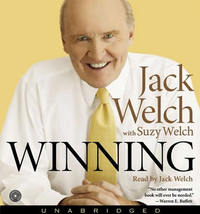Neutron Jack Welsh For Car Czar
By Bob Gordon, President and Co-publisher
The Auto Channel
Auto Central December 11, 2008; In trying to think of who can not only get the job, but who can do the job, only one name comes through loudly and clearly and that name is Jack Welsh.
His years of corporate management and corporate fat cutting will stand him in good stead in a battle against the auto industry's entrenched management and their lackey boards.
Mr. Welsh has shown the vigor and intelligence to reward where it is deserved, and change when change is demanded...he did it with GE and we believe can do it again with the U.S. auto industry.
He is strong and rich enough to not be cowed by those whose rhetoric will lead to more of the same old loosing ideas and methodologies.
So Jack when you are asked, please accept...our country's future as a world leader and our children's and grand children's welfare are at stake.
Car Czar, what a bully pulpit to help change the direction of our country's manufacturing future from...have fun!
Wikipedia: Jack Welsh's Tenure as CEO of GE
Through the 1980s, Welch worked to streamline GE and make it a more competitive company. In 1981 he made a speech in Hotel Pierre, New York City called ‘Growing fast in a slow-growth economy’ (8.12.1981).[2] This is often acknowledged as the "dawn" of the obsession with shareholder value.
He also pushed the managers of the businesses he kept to become more productive. Welch worked to eradicate inefficiency by trimming inventories and dismantling the bureaucracy that had almost led him to leave GE in the past. He shut down factories, reduced payrolls and cut lackluster old-line units. Welch's philosophy was that a company should be either #1 or #2 in a particular industry, or else leave it completely. Although he was initially treated with contempt by those under him for his policies, they eventually grew to respect him. Welch's strategy was later adopted by other CEOs across corporate America.
Each year, Welch would fire the bottom 10% of his managers. He earned a reputation for brutal candor in his meetings with executives. He would push his managers to perform, but he would reward those in the top 20% with bonuses and stock options. He also expanded the broadness of the stock options program at GE from just top executives to nearly one third of all employees. Welch is also known for destroying the nine-layer management hierarchy and bringing a sense of informality to the company.
During the early 1980s he was dubbed "Neutron Jack" (in reference to the neutron bomb) for eliminating employees while leaving buildings intact. In Jack: Straight From The Gut, Welch states that GE had 411,000 employees at the end of 1980, and 299,000 at the end of 1985. Of the 112,000 who left the payroll, 37,000 were in sold businesses, and 81,000 were reduced in continuing businesses. In return, GE had increased its market capital tremendously.
In 1986, GE acquired NBC, which was located in Rockefeller Center; Welch subsequently took up an office in the GE Building at 30 Rockefeller Plaza. During the 1990s, Welch helped to modernize GE by shifting from manufacturing to financial services through numerous acquisitions.
Welch adopted Motorola's Six Sigma quality program in late 1995. He led the company to massive revenues. In 1980, the year before Welch became CEO, GE recorded revenues of roughly $26.8 billion. In 2000, the year before he left, the revenues increased to nearly $130 billion. When Jack Welch left GE, the company had gone from a market value of $14 billion to one of more than $410 billion at the end of 2004, making it the most valuable and largest company in the world.
At the time of his retirement, Welch received a salary of $4 million a year, followed by his record retirement plan of $8 million a year. In 1999 he was named "Manager of the Century" by Fortune magazine.
There was a lengthy and well-publicized succession planning saga prior to his retirement between James McNerney, Robert Nardelli, and Jeffrey Immelt, with Immelt eventually selected to succeed him as Chairman and CEO. Nardelli became the CEO of Home Depot until his resignation in early 2007 and then moved on to Chrysler LLC, while McNerney became CEO of 3M until he left that post to serve in the same capacity at Boeing.



